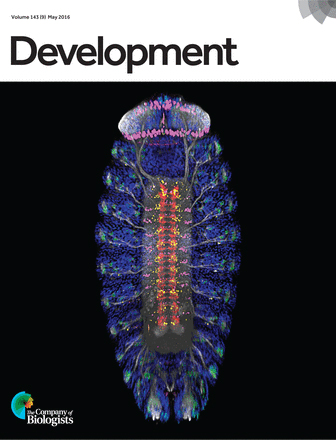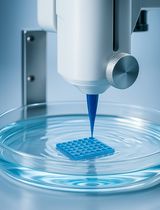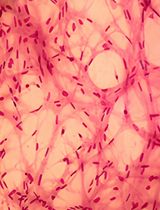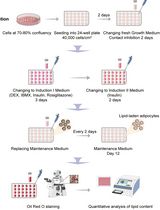- EN - English
- CN - 中文
Ex vivo Culture of Fetal Mouse Gastric Epithelial Progenitors
胎鼠胃上皮祖细胞的离体培养
发布: 2017年01月05日第7卷第1期 DOI: 10.21769/BioProtoc.2089 浏览次数: 9871
评审: Rakesh BamHui ZhuAnonymous reviewer(s)
Abstract
Isolation and tridimensional culture of murine fetal progenitors from the digestive tract represents a new approach to study the nature and the biological characteristics of these epithelial cells that are present before the onset of the cytodifferentiation process during development. In 2013, Mustata et al. described the isolation of intestinal fetal progenitors growing as spheroids in the ex vivo culture system initially implemented by Sato et al. (2009) to grow adult intestinal stem cells. Noteworthy, fetal-derived spheroids have high self-renewal capacity making easy their indefinite maintenance in culture. Here, we report an adapted protocol for isolation and ex vivo culture and maintenance of fetal epithelial progenitors from distal pre-glandular stomach growing as gastric spheroids (Fernandez Vallone et al., 2016).
Keywords: ex vivo (离体)Background
Mouse adult stem cells from the glandular stomach can be grown ex vivo in a 3D matrigel as ‘mini-glands’ for indefinite periods of time (Barker et al., 2010). As compared to stem cells from the small intestine growing in presence of EGF, Noggin and R-spondin 1, adult gastric stem cells need to be further supplemented with Fgf10, Gastrin, Wnt3a and a higher concentration of R-spondin 1 to get productive long-term cultures. In contrast, little was known till recently about the fetal cells that line the pre-glandular epithelium during development. So far, their nature as well as their potential growth properties ex vivo were uncharacterized. Based on the previous study identifying the cells present in the fetal small intestine (Mustata et al., 2013), we report on the culture of mouse fetal gastric progenitors as spheroids (Fernandez Vallone et al., 2016). Gastric progenitors can be replated in the culture medium previously reported by Sato et al., 2009 to grow small intestinal adult stem cells and, contrary to adult-type gastric stem cells, they do not need extra growth factors supplementation (Fgf10, Wnt3a or Gastrin).
Materials and Reagents
- Disposable scalpels (Swan Morton, catalog number: 0510 )
- Petri dishes 92 x 16 mm with cams (SARSTEDT, catalog number: 82.1473 )
- Microcentrifuge tubes, 1.5 ml (VWR, catalog number: 212-0198 )
- Tubes 10 ml, 100 x 16 mm, PP (SARSTEDT, catalog number: 62.9924.284 )
- Tubes 50 ml, 30 x 115 mm, PP (Corning, Falcon®, catalog number: 352070 )
- 70 µm nylon filters (Corning, Falcon®, catalog number: 352350 )
- P6 well plate (VWR, catalog number: 734-2323 )
- 40 µm nylon filters (Corning, Falcon®, catalog number: 352340 )
- P12 well plate (VWR, catalog number: 734-2324 )
- Tips refill (VWR, catalog numbers: 89079-464 ; 89079-470 ; 89079-478 )
- Cryotubes 1 ml (Greiner Bio One, catalog number: 123263 )
- Syringe filter 0.2 µm (VWR, catalog number: 28145-477 )
- Serological pipets 5 ml, 10 ml and 25 ml (Corning, Falcon®, catalog numbers: 357543 ; 357551 ; 357535 )
- Mice (tested on RjOrl:SWISS and C57BL/6JRj backgrounds)
- Dulbecco’s phosphate-buffered saline (DPBS), CaCl2 free, MgCl2 free (Thermo Fisher Scientific, GibcoTM, catalog number: 14190-094 )
- Fetal bovine serum (FBS) (Thermo Fisher Scientific, GibcoTM, catalog number: 10270 )
- Stem Pro Accutase cell dissociation reagent (Thermo Fisher Scientific, GibcoTM, catalog number: A1110501 )
- Matrigel® basement membrane matrix (Corning, catalog number: 354234 )
- Liquid nitrogen (supplied from Air liquide)
- Ethanol 95-97% (VWR, TechniSolv®, catalog number: 84857.360 )
- Glucose (Merck Millipore, catalog number: 1083371000 )
- Leibovitz’s L-15 medium (Thermo Fisher Scientific, catalog number: 11415-049 )
- 500 mM EDTA (pH 8.0) (Thermo Fisher Scientific, InvitrogenTM, catalog number: 15575-038 )
- Albumin from bovine serum (BSA) (Sigma-Aldrich, catalog number: A3294 )
- Advanced DMEM/F12 (Thermo Fisher Scientific, GibcoTM, catalog number: 12634-010 )
- Gentamycin 50 mg/ml (Thermo Fisher Scientific, GibcoTM, catalog number: 15750-037 )
- Penicillin-streptomycin cocktail 100x (Thermo Fisher Scientific, GibcoTM, catalog number: 15140-122 )
- Amphotericin B 250 µg/ml (Thermo Fisher Scientific, GibcoTM, catalog number: 15290-026 )
- L-glutamine (Thermo Fisher Scientific, GibcoTM, catalog number: 25030-081 )
- N-2 supplement 100x (Thermo Fisher Scientific, GibcoTM, catalog number: 17502-048 )
- B-27 w/o vit. A 50x (Thermo Fisher Scientific, GibcoTM, catalog number: 12587-010 )
- 1 M HEPES (Thermo Fisher Scientific, GibcoTM, catalog number: 15630-056 )
- N-acetyl cysteine (Sigma-Aldrich, catalog number: A7250 )
- Growth factors
Recombinant murine EGF (Peprotech, catalog number: 315-09 )
Recombinant murine Noggin (Peprotech, catalog number: 250-38 )
Recombinant murine CHO-derived R-spondin1 (R&D Systems, catalog number: 7150-RS/CF )
Rho kinase inhibitor Y27632 (Sigma-Aldrich, catalog number: Y0503 ) - DMSO (Sigma-Aldrich, catalog number: D8418 )
- Propanol-2 (VWR, catalog number: 1.09634.9900 )
- 70% ethanol (see Recipes)
- 1 M glucose (see Recipes)
- Embryo’s medium (see Recipes)
- DPBS-EDTA 5 mM (see Recipes)
- DPBS-BSA 2%-EDTA 2 mM (see Recipes)
- Basal crypt medium (BCM) (see Recipes)
- ENR medium for initial seeding (see Recipes)
- ENR medium for maintenance (see Recipes)
- Freezing medium (see Recipes)
- De-freezing medium (see Recipes)
Equipment
- Binocular (Motic, model: SMZ-168 )
- Cold light source (SCHOTT, model: KL1500 LCD )
- Scissors: straight sharp tip (Fine Science Tool, catalog numbers: 14090-09 and 14084-08 )
- Angled serrated tip forceps (Fine Science Tool, catalog number: 11080-02 )
- Standard (fine) tip forceps (Fine Science Tool, catalog number: 11251-20 )
- Micro-dissecting scissors (Fine Science Tool, catalog number: 15018-10 )
- Pipettors with Tip Ejector 20-200 µl and 100-1,000 µl (VWR, catalog numbers: 89079-970 and 89079-974 )
- Refrigerated centrifuge Refrigerated centrifuge (Beckman Coulter, model: Allegra X-15R )
- MaxQTM 4000 shaker with adaptable temperature (Thermo Fisher Scientific, Thermo ScientificTM, model: MaxQ TM 4000 )
- Biological safety cabinet (Esco Micro Pte, model: Class II Type A2 )
- Cell culture incubator (37 °C, 5% CO2) (BINDER, model: C150 )
- Inverted bright field microscope (Motic, model: AE31 )
- Nalgene Cryo ‘Mr Frosty’ freezing container (Thermo Fisher Scientific, Thermo ScientificTM, model: 5100-0050 )
- Ultra-low temperature upright freezer (Thermo Fisher Scientific, model: Thermo scientific Queue Basic )
- Cryostorage system K Series (Taylor-Wharton, model: 24K )
Procedure
文章信息
版权信息
© 2017 The Authors; exclusive licensee Bio-protocol LLC.
如何引用
Vallone, V. F., Leprovots, M., Vassart, G. and Garcia, M. (2017). Ex vivo Culture of Fetal Mouse Gastric Epithelial Progenitors. Bio-protocol 7(1): e2089. DOI: 10.21769/BioProtoc.2089.
分类
干细胞 > 成体干细胞 > 维持和分化
细胞生物学 > 细胞分离和培养 > 3D细胞培养
您对这篇实验方法有问题吗?
在此处发布您的问题,我们将邀请本文作者来回答。同时,我们会将您的问题发布到Bio-protocol Exchange,以便寻求社区成员的帮助。
Share
Bluesky
X
Copy link
















